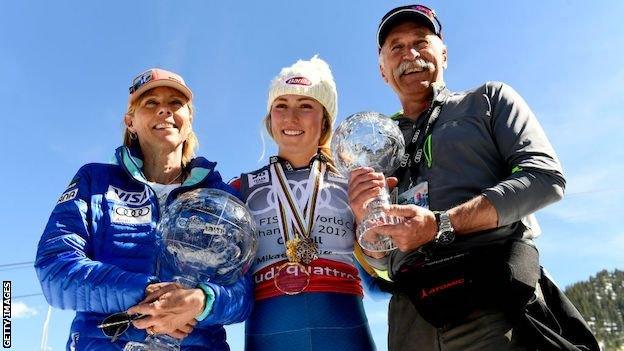Mikaela Shiffrin on father's death, changing perspective and Beijing 2022 Winter Olympics
- Published

Mikaela Shiffrin with her parents Eileen and Jeff in 2017
Mikaela Shiffrin was struggling to get going when the rest of the world stopped.
For her family, 2020 was the worst of years even before the coronavirus pandemic took hold in March. A month prior, Shiffrin's beloved father, Jeff, had died after an accident at home, external in Colorado.
"It almost gave us a chance to catch our breath, but just in the worst possible way," said the Alpine skier.
Jeff had been an ever-present at the foot of mountains, a camera hanging from his neck, snapping away alongside the professional photographers as his daughter amassed her collection of Olympic, World Championship and World Cup titles.
His death, Shiffrin said, felt like "losing part of my heart".
"People say when somebody you love passes away, your world stops and the rest of the world moves on after a couple of days, and all you think is how can everybody be going, and living, and be fine, like they forgot already," she told Sportsworld on the BBC World Service.
"I'm still here thinking about it, not able to sleep or eat, having random panic attacks at points when you would least expect it - when I'm in the middle of a workout, when I'm in a set of squats, and all of a sudden I just… can't. I can hardly even put down the weight, I'm bawling my eyes out.
"And then all of a sudden nothing was normal, and I was like 'this must be the one time in history where the entire world actually did stop?'"
It did - but in Shiffrin's case, not for long. The 26-year-old attempted a return to the World Cup tour in March 2020, only for the final races to be cancelled because of the pandemic. She finally returned in November, some 300 days since her last race.
Yet for someone so used to winning, victories were hard to come by. She won just three races, albeit a haul that included the alpine combined gold which made her the most decorated American skier in World Championships history.
Allow Instagram content?
This article contains content provided by Instagram. We ask for your permission before anything is loaded, as they may be using cookies and other technologies. You may want to read Meta’s Instagram cookie policy, external and privacy policy, external before accepting. To view this content choose ‘accept and continue’.
Shiffrin used to think anything other than gold was a disaster, but the last year quickly put that into perspective.
"[Wins] don't feel the same. It feels like I appreciate successes more, especially the successes that aren't wins. I appreciate medalling, period," said Shiffrin, who is third on the all-time list for alpine skiing World Cup wins with 69.
"I was so often on the top step that it felt that anything less was an absolute devastating under-performance. It feels different now.
"I also feel really grateful to be on the podium, that's still a very high level of skiing and I'm sort of accepting it for what it is, but using it as motivation to try to get on the top step again."
That's not to say she has a single target win in mind. Shiffrin simply wants to "ski faster", and she hopes to do that in less than a year's time at the Winter Olympics in Beijing.
She won two medals, including giant slalom gold, at Pyeongchang 2018 to add to her slalom gold from Sochi 2014, but she will enter her third Olympics with a different mentality.
"As long as I'm good at this, I want to do it. I still have the motivation there," she said. "I think the Olympics in Beijing next year, I think I could go into that with a different attitude.
"I know the best of it, and also in some ways the worst of it. I'm going into it with a much more open mind."
Shiffrin is trying not to listen to the noise surrounding Beijing, amid calls for governments to boycott the Games because of reported human rights abuses against the Uighur people in China.
Earlier this month, the US State Department denied reports, external it was considering a joint boycott of the Games alongside allies.
"I feel generally frustrated that any athlete, myself included, is ever put in a position to choose morality or human rights or even consider that over something they've worked for their entire career and their entire life," said Shiffrin.
"I feel lucky I've competed in some Olympics and I've won Olympic medals, I feel lucky to have had that opportunity. Not every athlete has had that opportunity and it could be their one shot.
"That's a really big thing, but there's also a lot of other really big things in the world."